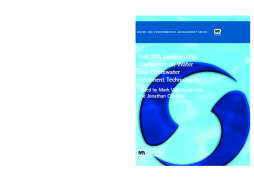
BOOK
2nd IWA Leading-Edge on Water and Wastewater Treatment Technologies
Mark C. M. van Loosdrecht | Jonathan Clement
(2005)
Additional Information
Book Details
Abstract
Wastewater and drinking water treatment are essential elements of urban infrastructure. In the course of the last century there has been enormous technical development, so successful that for the general public in industrialized countries this infrastructure is hardly noticed. Nevertheless there is ongoing activity to further improve the existing processes. The IWA Leading Edge Technology conference held in Prague helped to stimulate this development and this book helps disseminate the results. A selection of presentations from the conference are included in this volume. Wastewater and drinking-water treatment are normally considered as two separate fields due to the very different boundary conditions that apply. Nevertheless several issues such as membrane processes, removal of micropollutants and water reuse are of crucial importance to both. This potential for cross-fertilization further enhances the value of this collection of high-quality articles that delineate the leading edge of research and development in water and wastewater treatment.
Table of Contents
| Section Title | Page | Action | Price |
|---|---|---|---|
| 2nd IWA Leading-Edge Conference on Water and Wastewater Treatment Technologies | ii | ||
| Contents | vi | ||
| Preface | x | ||
| Part One: Drinking Water | 1 | ||
| Influence of NOM and Membrane Surface Charge on UF-membrane fouling | 3 | ||
| The use of advanced analytical tools for the characterization of organic foulant of MF and UF membranes | 13 | ||
| Ceramic MF with Submicron-sized Activated Carbon Adsorption and Coagulation Pretreatments for Rapid and Effective NOM Removal | 23 | ||
| Air sparging in capillary nanofiltration | 33 | ||
| The Behavior of Inorganic and Organic Compounds during Ultrafiltration Treatment of Spent Filter Backwash Water | 43 | ||
| UV/H2O2 retrofit of PWN's water treatment plant Andijk for primary disinfection and organic contaminant control | 53 | ||
| Simulation of Ozone-UV Reactors for Water Treatment | 67 | ||
| Nitrite Formation, a useful Tool in Medium Pressure UV Fluence Control | 77 | ||
| Recent Advances in NOM Removal | 87 | ||
| Characterization of Natural Organic Matter in Advanced Water Treatment Processes for DBPs Control | 97 | ||
| A New Treatment Process for Removal of NOM by Adsorption and Regeneration of Granular Ferric Hydroxide (GFH) | 107 | ||
| Removal of AOC and NOM from water with Nanofiltration | 117 | ||
| Measuring Discoloration Risk: Resuspension Potential Method. | 123 | ||
| Physical Behaviour Of GAC Filter Beds Under Warm, Eutrophic Conditions | 133 | ||
| MTBE Removal by Biofiltration in a Water Works | 141 | ||
| Assessing Riverbank Filtration Removal Mechanisms | 145 | ||
| Part Two: Wastewater | 153 | ||
| Simulation of full scale plants: Benefits and drawbacks | 155 | ||
| Advanced CFD tool for Wastewater: Today Complex Modelling and Tomorrow Easy-to-use Interface | 165 | ||
| Instrumentation and Control in Anaerobic Digestion | 173 | ||
| Optimisation of WWTP Units Using CFD - A Tool Grown For Real Scale Application | 183 | ||
| An Optimised Result of the Sludge Dewatering Process During Twenty-Four Hours per Day | 193 | ||
| Removal of estrogenic trace contaminants from wastewater and landfill leachate with advanced treatment processes | 201 | ||
| Comparison of the Elimination of Endocrine Disrupters in Conventional Wastewater Treatment Plants and Membrane Bioreactors | 211 | ||
| Electrochemical regeneration of a carbon based adsorbent as a process for the removal of organic compounds from wastewaters | 221 | ||
| Ozone and UV processes for additional wastewater treatment to remove pharmaceuticals and EDCs | 231 | ||
| Detection of estrogenic effect formation potential in chlorinated drinking water | 241 | ||
| Sludge Minimization in a Full-Scale Biological Denitrification Plant | 253 | ||
| Hydrogen-Based Membrane Biofilm Reactor for Wastewater Treatment | 263 | ||
| Biofilm Treatment of MTBE | 271 | ||
| Landmark Advances in Sludge Conditioning and Dewatering | 281 | ||
| An innovative application for an established technology to improve sludge dewatering | 291 | ||
| Kemicond – Acid Oxidative Sludge Conditioning Process | 301 | ||
| Sludge hygienisation – techniques and experiences | 311 | ||
| Supercritical Water Oxidation of Sewage Sludge in Combination with Phosphate Recovery | 323 | ||
| Full Scale Application of high rate Digestion to improve Stabilisation | 333 | ||
| The Use of Treated Wastewater for Nature: The Waterharmonica, a Sustainable Solution as an Alternative for Separate Drainage and Treatment | 341 | ||
| Demonstration Project for Separate Discharge and Treatment of Urine, Faeces and Greywater - Cost Comparison with the Conventional Wastewater System | 351 | ||
| Wastewater Treatment Plant of the Future - Decision Analysis Approach for Increased Sustainability | 361 | ||
| Data-driven Approach to Sewage Inflow Prediction | 371 | ||
| Anaerobic Treatment of Domestic Wastewater in Brazil: Overview | 381 | ||
| Keyword index | 385 |
